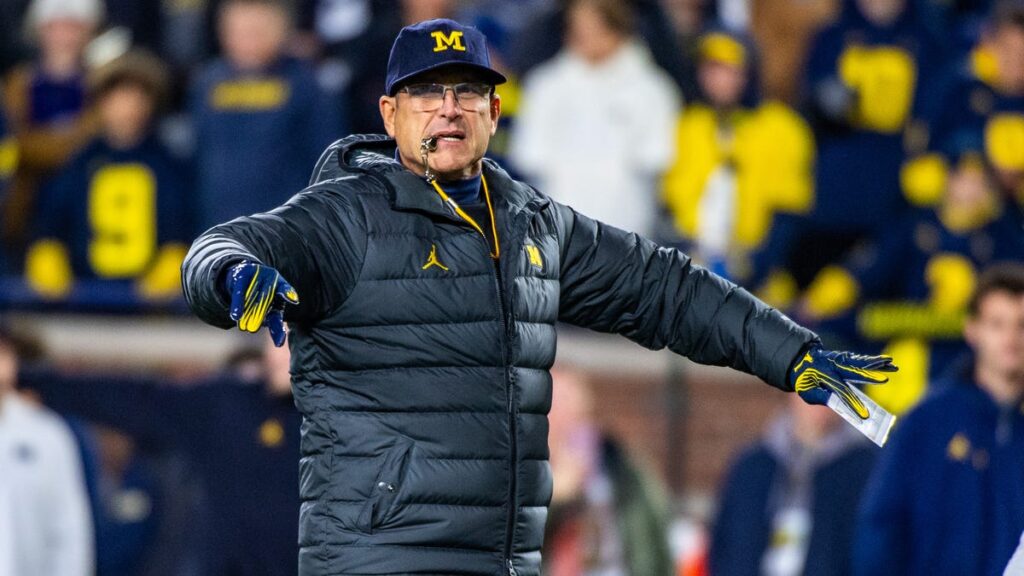Jim Harbaugh’s Michigan Wolverines enter the week ranked number three in the nation in the CFP rankongs, behind top-seeded Ohio State and number two Georgia. And while all seems to be well on the field for Michigan, discipline by either the NCAA, Big Ten, or both, looms on the horizon for Harbaugh and the university.
If reports are to be believed, the NCAA has revealed the results of their investigation into stealing other team’s signs by former Michigan staffer Connor Stalions, who resigned from the school last week. Stalions is accused of using dozens of accomplices to scout other teams (and their signs) in person, in contravention of NCAA rules, as bizarre as it sounds. It’s not the sign stealing that is explicitly prohibited by the NCAA, it’s the in-person scouting.
“Everyone in college football engages in sign-stealing to some extent, but you’re not supposed to do it in person,” college sports law attorney Mit Winter told Deadspin, pointing out that while many schools watch film of their opponents in an attempt to pick up signs, sending a dedicated staffer to watch an opponent in person may give Michigan a competitive advantage. Winter added, “Michigan was doing something they weren’t supposed to be doing, which a lot of other schools would probably have liked to do. And they feel it gave Michigan a competitive advantage.”
The NCAA can certainly levy penalties of its own, but NCAA investigations are not known for their brevity or elegance. Any discipline on that front could be years away. That leaves the Big Ten as disciplinarian-in-chief, at least for now, for those who are demanding that Harbaugh and his team face some kind of penalty this season. The problem is that 1) the Big Ten has no specific rule against scouting an opponent in person. Any discipline for Harbaugh and Michigan would have to come under the Big Ten’s Sportsmanship Policy, which only allows for Standard and Major Disciplinary Action. Standard Disciplinary Action can include “admonishment, reprimand, fines that don’t exceed $10,000, and suspensions from no more than two contests.” It’s hard to imagine any of those choices making anyone involved happy, except maybe Michigan.
Major Disciplinary Action is basically defined as anything worse than a Standard Disciplinary Action, and has to be approved by a Joint Group Executive Committee, made up of member university presidents, who can either approve or lessen the penalty, but can’t increase it.
Secondly, while NCAA bylaws state that head coaches are responsible for the actions of their assistant coaches and staffers, the Big Ten has no such rule. That means the Big Ten would have to find evidence that Harbaugh directed Stallions’ actions, or at the very least, was aware of them and did nothing. That is evidence that, so far, neither the NCAA nor the Big Ten appears to have. Suspending a head coach for something no one can prove he even knew about is a slippery slope, even if other Big Ten coaches don’t see it that way in this instance. And with Stalions refusing to cooperate with either the Big Ten or NCAA investigations, there isn’t much that can be done about it.
Complicating matters more is a Sports Illustrated story that broke just late last night, which suggested that Michigan has also been on the receiving end of sign-stealing by rival Big Ten schools. Per SI:
“A former Big Ten coach at a rival school in recent days forwarded to the Wolverines copies of two single-page documents listing Michigan’s deciphered signals, three sources with knowledge of the situation confirmed to Sports Illustrated. The former Big Ten coach was a member of a staff that he said last season received multiple detailed breakdowns of which signals corresponded to which play calls. He told Michigan, according to the sources, that the information had originally come from other Big Ten schools.”
According to the report, “the former coach shared the documents with Michigan in an attempt to show that signal-stealing is pervasive in the sport and to support embattled head coach Jim Harbaugh.”
That certainly adds a fly to the ointment, doesn’t it?
At this point, no one is talking about voiding wins, though the NCAA certainly has done it for lesser crimes — USC having to vacate a national championship over Reggie Bush, anyone? Winter believes the most likely outcome is that Harbaugh gets suspended for a few games and both he and the University get fined, but we have yet to see how Michigan’s aggressive defense of Harbaugh and the team plays out, especially if evidence of more sign stealing by other Big Ten teams comes to light. But it’s the blatant and systemic nature of Michigan’s behavior that seems to have everyone hot under the collar. After all, Stalions has been accused of showing up on the Central Michigan sidelines in Chippewas gear during a recent game.
As my colleague Sean Beckwith pointed out, it’s much like the Houston Astros sign-stealing scandal — everyone in baseball tries to steal signs, but using video equipment in the center field scoreboard and then banging on a garbage can to relay the results was simply a bridge too far.
So now, at a time when everyone should be excited about the second set of CFP rankings and potential bowl eligibility, the world of college football is instead in an uproar about one of the best teams in the country stealing signs. And that team’s best defense? “Everyone is doing it. And we didn’t know about it, anyway.”
They won’t, but the Big Ten could simply make this easy on everyone and declare that no one is allowed to steal signs from anyone else, with the exception of whatever can be gleaned from watching film, starting . . . now.




